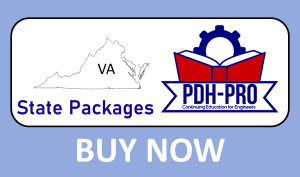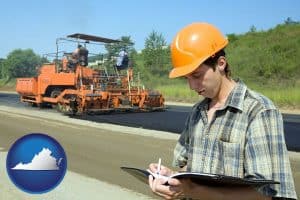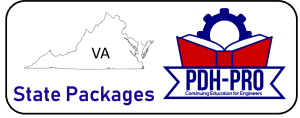CEU Requirements for Virginia Professional Engineers
Table of Contents
 One of the most common questions asked by VA PEs renewing their license – What are the continuing education requirement for Virginia professional engineers?
One of the most common questions asked by VA PEs renewing their license – What are the continuing education requirement for Virginia professional engineers?
Virginia engineers must earn 16 PDHs during every two year renewal period. Courses must improve or expand the skills of the engineer. No credits may be carried forward into the next renewal period. The renewal date for Virginia professional engineers is the last day of the month two years from the date of license issue.
If you are looking for courses that satisfy the Virginia continuing education requirements, we offer complete packages for Virginia Engineers.
For a complete list of all license renewal requirements check out our Virginia PE renewal page.
Virginia PDH Credits
The Virginia Board for Architects, Professional Engineers, Land Surveyors, Certified Interior Designers and Landscape Architects (APELSCIDLA) establishes continuing education requirements for the state. APELSCIDLA is part of the Department of Professional and Occupational Regulation (DPOR). DPOR requires every professional engineer to renew his or her license every two years (biennally). Each engineer must complete 16 PDH hours during each renewal period. The Board does not require ethics or state law courses, but they are accepted for continuing education credit.


The license renewal process is done electronically in Virginia. The DPOR does not require engineers to submit certificates of completion from continuing education courses. Professional engineers are expected to keep copies of these documents for at least 3 years in the event of an audit.
Virginia License Renewal Dates
Virginia PEs must renew their license biennially (2 years). The date of license renewal is based on the date the original engineering license was issued. Licenses renew on the last day of the month two years from the date of issue.
The VA PE license renewal process can be done completely online. It is important to renew your engineering license before the deadline to avoid being disciplined by the Board. The DPOR considers having a temporary lapsed license to be practicing engineering without a license. Every year, the Board issues disciplinary actions to professional engineers for license related administrative oversights. To make matters worse, you must report this disciplinary decision to the other state engineering boards where you are licensed or you may be sanctioned for failing to notify them in a timely manner.
Records Keeping Requirements for Engineers
DPOR requires every professional engineer to maintain records of their PDH hours for three years. These documents are not submitted during license renewal. However, the board periodically conducts random audits to determine compliance with CE activities. Licensees who are selected for audit have 21 days to provide the requested documentation. For this reason, it is important to keep copies of all certificates of completion and maintain them in an organized manner. PDH-Pro maintains all course records for our students and allows access through the online student account 24/7.
Most course providers issue a certificate to verify completion of engineering continuing education activities. The Board allows either paper records or electronic files to prove compliance with the Virginia continuing education requirements. The certificate must include the date the course was completed, the name of the instructor, the name of the course provider or institution, the title of the course, and the number of credit hours awarded. Payment receipts or seminar agenda listings are not acceptable documentation.
Continuing Education Activities Accepted by DPOR
The Board accepts a variety of activities for the 16-hours of CE credit. Activities must be related to the practice of the profession and have a clear purpose and objective. The subject matter must either maintain, improve, or expand the skills and knowledge relevant to the engineer’s area of practice. The Board allows courses in areas related to business practices, including project management, risk management, and ethics, as long as it is relevant to the practice of engineering.
DPOR will only accept courses taught by instructors who are competent in the subject matter, determined by their education or experience. For self-directed (online) courses, the Board requires the course provider to issue an assessment (i.e. quiz) that verifies mastery of the the purpose and objective of the course.
Online Courses: Engineers are allowed to take any number of online courses to meet the Virginia continuing education requirement. The Board regulations (18VAC10-20-683) indicate there is no limit for internet based continuing ed classes, provided the activity has relevance to the licensee’s area of practice as defined in § 54.1-400 of the Code of Virginia. More than 84% of Virginia professional engineers say they earn some or all of their PDH requirements from online courses.
Live Webinars:  Live webinars are accepted by the APELSCIDLA for continuing education credits as long as they are relevant to the practice of engineering. In this format, courses are taught by a subject matter expert using one of many online platforms. Webinars are very popular because participants can interact directly with the instructor. Engineers report that this type of class is more enjoyable and interesting compared to other formats.
Live webinars are accepted by the APELSCIDLA for continuing education credits as long as they are relevant to the practice of engineering. In this format, courses are taught by a subject matter expert using one of many online platforms. Webinars are very popular because participants can interact directly with the instructor. Engineers report that this type of class is more enjoyable and interesting compared to other formats.
Seminars: Many engineers like to earn continuing education credits by attending live training events such as conference presentations, in-person seminars held by continuing ed providers, college courses, and engineering society meetings. These opportunities are a great way to earn required PDH credits. The Virginia board accepts most seminar courses as long as they meet the general requirements for continuing education. Before registering for a seminar, you should confirm that the sponsor will provide documentation of completion that meets the board’s requirements.
Pre-Approval of Continuing Education Activities
The Virginia engineering board does not pre-approve continuing education courses or course providers. It is up to each licensee to determine if an activity meets the Virginia continuing education requirements or not. The DPOR lists its guidelines to make this determination, but they do not review courses in advance. Currently, only six states pre-approve continuing education providers.
Free Continuing Education Courses for VA Engineers
Virginia engineers have several options for free courses. If you are a member of a professional society, such as ASME or ASCE, you may be able to complete continuing education courses free of charge. The Virginia Board accepts issued US Patents, courses you teach, and published papers in peer-reviewed journals as continuing education credit. There are many free CEU course options available for professional engineers in Virginia.
Complete Engineering Packages for Virginia PEs
 PDH-Pro has a team of experts who monitor the license renewal requirements for Virginia to ensure our courses meet the requirements of the DPOR. We developed our Virginia Engineering Packages to offer PEs a convenient way to renew their license and satisfy the Virginia engineering board CEU requirements. Our packages were developed by engineering discipline – chemical, civil, electrical, environmental, geotechnical, mechanical, and structural. They allow Virginia professional engineers to focus on technical matters without having to worry about the CE requirements.
PDH-Pro has a team of experts who monitor the license renewal requirements for Virginia to ensure our courses meet the requirements of the DPOR. We developed our Virginia Engineering Packages to offer PEs a convenient way to renew their license and satisfy the Virginia engineering board CEU requirements. Our packages were developed by engineering discipline – chemical, civil, electrical, environmental, geotechnical, mechanical, and structural. They allow Virginia professional engineers to focus on technical matters without having to worry about the CE requirements.
Engineering Discipline Restrictions
Virginia allows professional engineers to complete continuing education outside their specific engineering discipline. The only CEU requirement is that it must contribute to the licensee’s area of practice. The Board acknowledges that the practice of engineering requires a broad understanding of the principles of physics, chemistry, mathematics, and other technical areas. Allowing engineers to expand their knowledge and skills into other disciplines enhances and improves their practice and overall competency.
